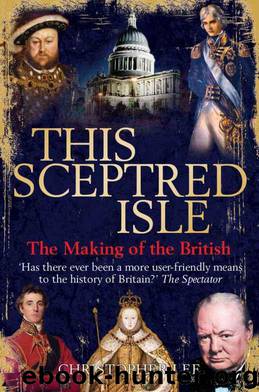This Sceptred Isle by Lee Christopher

Author:Lee, Christopher [Lee, Christopher]
Language: eng
Format: mobi, epub
Publisher: Constable Robinson
Published: 2012-01-19T00:00:00+00:00
CHAPTER THIRTY-THREE
1721–6
Robert Walpole (1676–1745) was a short, stout, ruddy-faced Norfolk farmer who hunted most of the season. In 1721 he became Britain’s first Prime Minister – a title quite new to government and one used pejoratively because he took so much authority on himself. A simple description of Walpole might be: the first Prime Minister and the person who managed the embarrassment and political position of court, party and government – the three victims of the greed and unwise investments of the moment. He brought political stability to Britain, and he set the style and method of government management for the rest of the eighteenth century. Walpole had been sent to Eton and then in 1696 up to Cambridge University. He was there for only two years, but would have been aware of the terrible turmoil of the country and the monarchy. In his first year, there was, or it was said that there was, a plot to assassinate King William III. In his second year, the War of the Grand Alliance against France came to an end with the signing of the Treaty of Ryswick – the accord that momentarily set the balance of power in Europe in favour of the Habsburgs of Spain and the Holy Roman Empire.
Walpole left Cambridge because his brothers died and, at the age of twenty-two, he returned to Norfolk to run the family estate. Two years later, in 1700, his father died and Walpole became head of the family, married his first wife, Catherine, and then became the Whig MP for Castle Rising and, in the following year, for King’s Lynn – a seat he was to hold for most of the rest of his life. In 1708 he became Secretary of War and later Treasurer of the Navy. These were important posts: England was leading the Alliance in the War of Spanish Succession. Walpole was, by then, the established leader of the Whig Junto in the Commons. But when Queen Anne came to the throne, Harley became head of the Tory government. He needed to get rid of the outspoken Walpole and through some curious and historically unproven corruption, Walpole was actually expelled from the Commons and even sent to the Tower for six months. But by the time of George I’s accession, Walpole was back in favour and, in October 1715, became Chancellor of the Exchequer. That was the year of the Jacobite uprising and Walpole helped to put it down.
Walpole’s rise to power had much to do with his own authority in managing party affairs and government but also, in the early years especially, it had a great deal to do with his cousin, who was also his brother-in-law, Charles Townshend, the second Viscount Townshend and later known as Turnip Townshend: he too was a Norfolk farmer.
The brothers-in-law were clearly of similar persuasion and neither liked King George’s preparations for his adventures in the Baltic (Britain’s military power was one of the few attractions for the Hanoverian). Walpole said Britain
Download
This site does not store any files on its server. We only index and link to content provided by other sites. Please contact the content providers to delete copyright contents if any and email us, we'll remove relevant links or contents immediately.
| General Broadcasting | History & Criticism |
| Reference |
Childhood's End by Arthur C. Clarke(2086)
The Fellowship of the Ring (The Lord of the Ring, #1) by J.R.R. Tolkien(1780)
Childhood's end by Arthur C. Clarke(1666)
The Stars Are Fire by Anita Shreve(1663)
Tolkien, J. R. R. - The Fellowship of the Ring by Tolkien J. R. R(1548)
The Lord of the Rings: The Fellowship of the Ring, the Two Towers, the Return of the King by J. R. R. Tolkien(1439)
Howard Stern Comes Again (9781501194313) by Stern Howard(1418)
Ballet For Dummies by Scott Speck & Evelyn Cisneros(1412)
Black Privilege by Charlamagne Tha God(1354)
The Return of the King by J.R.R. Tolkien(1288)
Thunderstruck by Erik Larson(1271)
Dark Fire by C.J. Sansom(1269)
The Fellowship of the Ring (The Lord of the Rings, Book 1) by J. R. R. Tolkien(1235)
The Lord Of The Rings Part 03: The Return Of The King by J.R.R. Tolkien(1228)
Agatha Christie - 1945 - Sparkling Cyanide by Agatha Christie(1222)
Frenchman's Creek by Daphne Du Maurier(1200)
Narnia 02 - The Lion, the Witch and the Wardrobe by C. S. Lewis(1158)
The Fellowship Of The Ring by J.R.R. Tolkien(1154)
The Collected Raymond Chandler by Raymond Chandler(1150)
